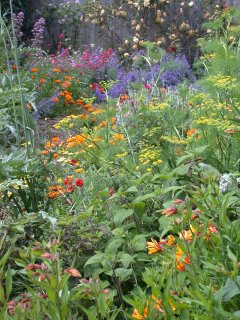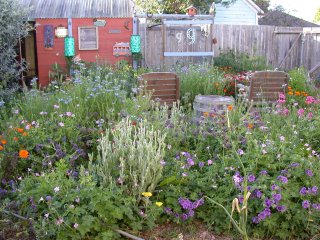If you haven't been to Heronswood Nursery in Kingston, WA, it's too damn late. The owner, Dan Hinkley, sold it to Burpee, and they have--yep, you guessed it--shut 'er down.

Brilliant plantsman Dan Hinkley, who continued to run the nursery after he sold it, was horrified to show up and learn that Burpee had shut it down with no notice. He told the
Seattle Times: "The hardest thing for me to swallow right now is that this is what people feared would happen," he said. "It was my decision to sell to a large corporate nursery, and it was not a decision that was made lightly, but I made it, so ultimately I am the person to blame."
It's not clear what will happen next. There's talk of keeping the online business open, but relocating the plants to the East Coast. Burpee hopes to find a buyer who will appreciate, rather than pave over, the gorgeous display gardens filled with Hinkley's treasures from around the world. But given Burpee's matter-of-fact focus on profits, I wouldn't be surprised if paving over it turned out to be a fine option, too.
What galls me the most is Burpee's blatant East Coast-centric-ness about this deal. In a
Kitsap Sun article, Burpee president George Ball bashes the plant selection for being too well-suited to the Pacific Northwest. "The vast collection of plants, while they were terrific for people in the Pacific Northwest, they weren't good for people in places like Iowa and Pennsylvania," said Ball.
Really? So, let me make sure I understand this. You buy a nursery located in Washington State that specializes in plants that do well on the West Coast, and then you're surprised that those plants won't grow in Pennsylvania.
He goes on to make this astonishing statement: "When we purchased this six years ago," he said, "we were anxious to make it a profitable company that would be fulfilling our ambition to serve a national audience of gardeners, which is predominantly on the East Coast."
Huh. A national audience...predominantly on the East Coast...Because California is...uh...
the world's sixth largest economy, and the populations of California, Oregon, and Washington exceed those of New York, Pennsylvania, Connecticut, Massachusetts, and New Hampshire combined. Add to that our year-round growing climate, throw in--oh, I don't know--
Canada--and I can see how you'd have a hard time selling us plants.
So instead, Ball is considering taking the plants "back to its Pennsylvania research and production facilities to work on adapting them to other climates less genial than the Pacific Northwest." Ah yes, just imagine the new, glorious, Burpeefied American landscape, populated with reliable year-round bloomers that are perfectly adapted to zones 1-11. I'll never again have the awful burden of traveling to another part of the country and coming across a plant I haven't seen before. Why, it's on page 11 of the Burpee catalog, and yes, it will do just fine in--where is that you live again? Well, no matter--it will grow there, too!
Ball goes on to take a more inclusive approach to insulting gardeners by insisting on dumbing down Hinkley's fine catalog. The Kitsap Sun reports that: "Both Hinkley and Ball indicated that there have been differences over Hersonswood's catalogue, revamped this year with only 250 plants offered and full of bright, colorful pictures like most standard offerings from giant retailers. Hinkley called it a dumbing down that talked down to Heronswood's core customer base. Ball said the old one read like a textbook."

That's right, folks. Burpee knows what you want. Bright, shiny catalog pages filled with ruby red tomatoes and happy little annuals that will grow in any climate. Good, because that's what you're getting.
I close with this sadly prophetic little snippet from Heronswood's February 2006
newsletter. If only George Ball would read his own textbook.
"We humans have an irresistible, sometimes inexplicable, compulsion to “enhance” whatever nature gives us, whether we’re breeding beefier livestock, more abundant crops, or larger flowers. In the garden, you need only survey the hybrid peonies, daylilies, and hostas available today—in a bewildering array of unlikely colors, outlandish sizes, and splashy patterns—to see how very different our altered ornamental plants can be from their wild ancestors. Of course, some of the more bizarre results of selective breeding also make it clear why many gardeners are eager to rediscover the simple elegance of original, unrefined species. "
Read on:
Seattle PI:
World-famous Heronswood Nursery closesHeronswood NurseryMore expletives from the blogosphere
here,
here,
here, and
here. Watch out, they're a little upset. Let Burpee know how you feel
here.
Want to support Dan Hinkley in his new, post-nursery life? (He signed a non-compete clause, so there will be no new nursery for a few years.) Buy one of his books from a
Pacific Northwest independent bookseller.





